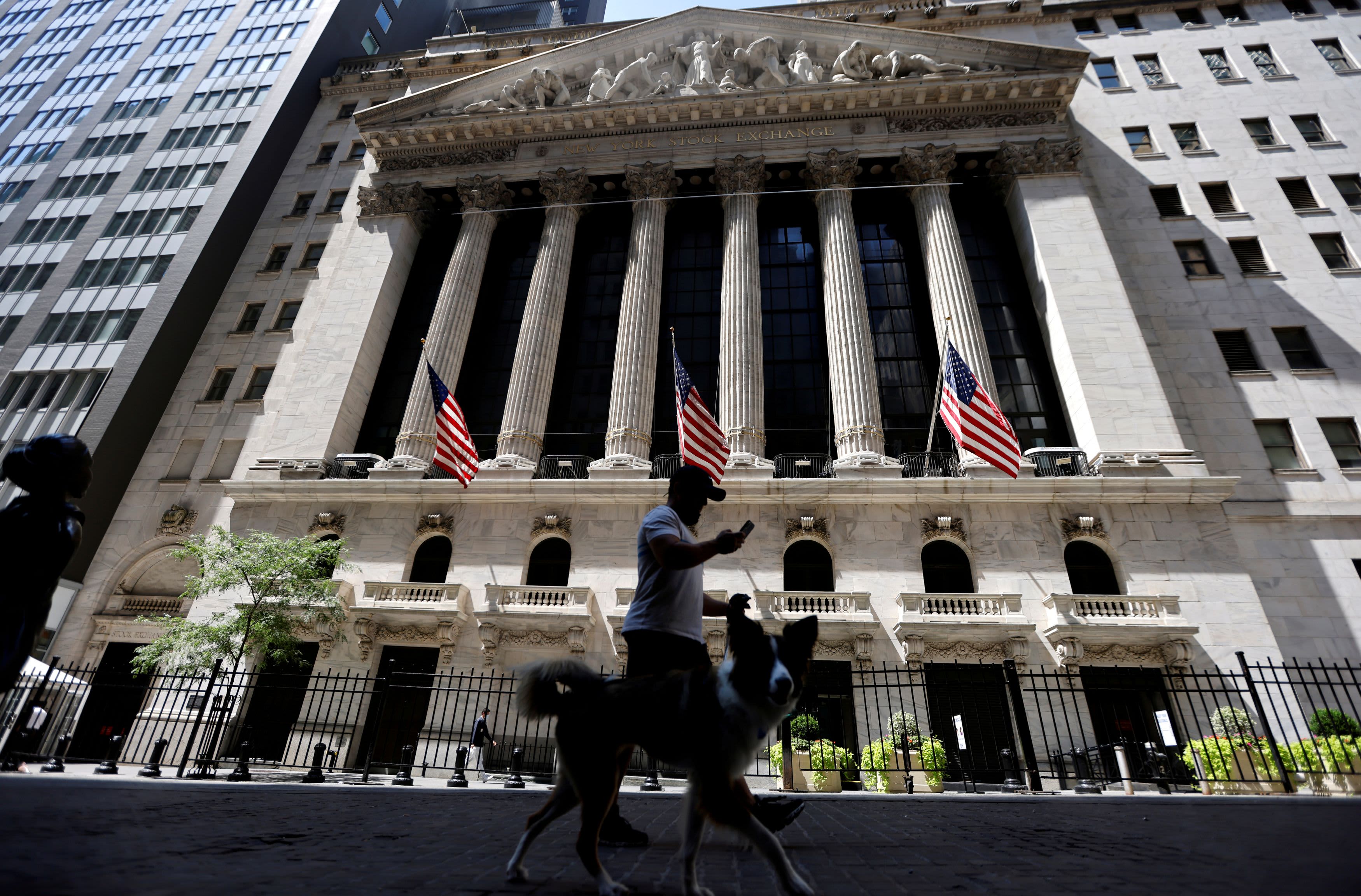A man walks a dog in the shade away from the midday sun past the New York Stock Exchange (NYSE) building in Manhattan, during hot weather in New York City, New York, U.S., August 11, 2020.
Mike Segar | Reuters
The swift correction in Nasdaq and technology stocks has cleared away some of the market’s speculative froth, but there is likely to be a period of choppiness before stocks begin a new march higher, strategists say.
Stocks staged an impressive spring back rally Wednesday, with the Nasdaq recovering 2.7% after a three-day 10% decline, the quickest correction ever. Stocks like Apple, Tesla, Amazon and Microsoft all gained sharply. The S&P 500 was up 2.4% , and the Dow also jumped 2.3%. The small cap Russell 2000 lagged with a 1.5% gain.
“We’ve seen this before. You get a down 10%, and people go right back in. But I think we do have an awful lot of questions,” said Steve DeSanctis, Jefferies equities strategist. DeSanctis said the election is hanging over markets, as well as concerns that it could be contested if there’s no clear outcome Nov. 3. There is also worry about the economic recovery and fate of the next fiscal stimulus package.
“We’re saying range bound,” said DeSanctis. “Until the market answers all these questions, it’s hard to see the same type of blow off we saw in July and August.”
Matt Maley, chief market strategist at Miller Tabak, said the market likely needs another rout before it can rebound. “That bounce gives people encouragement that the worst is over, but when we make a lower low, that’s when they throw in the towel,” he said. “You usually get a second leg…I don’t think we’re going to have a 35% decline like we saw last time because the Fed is there to do whatever it takes to prevent that from happening.”
Maley said he does not expect to see capitulation and an end to the sell-off until there’s a rally that fails. “The failed rally doesn’t usually take a long time,” said Maley. “I think this is something we’re going to be playing with at least for the month of September. My [S&P 500] target is 3,200. The 15% level is 3,000. That’s the level we bounced off of in June twice. I think we’ll hold that level. That’s the line in the sand.”
Scott Redler, partner with T3Live.com, said investors still have a positive view about the market and traders were looking for a rebound. He said the S&P 500 will be tested when it reaches the 3,427 to 3,460 resistance area, a zone that is about half of its recent decline. “Usually, you get a three day decline and you get a bounce back. The question is what kind. We still have to see if this is different,” said Redler, who follows the market’s short-term technicals. “So far, all they really did is take out the momentum in the market and bent it. It’s definitely far from broken.”
Redler said his gut feeling is the low was not put in during Tuesday’s sell-off. “Usually bottoms are made with a washout, not a bump up and grind. It’s hard to come to any clear conclusion,” he said. Redler said he is watching the Investco QQQ Trust ETF, which represents the Nasdaq 100.
The QQQ was up 3.2% Wednesday, at about $278. Redler said an important level will be $284 to $286. “This is the first rebound attempt. It could go for a few days to work off the oversold nature of the market because we came down in such a fast and furious manner,” he said. “The easy short was made, the easy long was made, and now it’s going to be a battle ground to see who was right four weeks from now.”
Whether the 10% decline is a blip or part of a larger move is yet to be seen. Either way, Charles Schwab Chief Investment Strategist Liz Ann Sonders expects the choppiness to continue.
“Similar moves in the past have seen rebounds for a day or two,” said Sonders.
She said there could be some continued fallout from speculative behavior, including heavy trading by retail investors in the options market. She said based on discussions with options experts, it appears others, besides SoftBank, were taking big positions in call options of tech and momentum names. Traders have said that activity could have triggered upside moves during the typically quiet month of August because sellers of call options have to buy stock. Call options are investments that reflect expectations for higher stock prices.
“There could be ripple effects that haven’t fully unwound,” she said.
Sonders said the recovery from the downdraft could also be affected by a new type of retail investor, who emerged after the March sell-off and helped drive stocks higher. She said the new type of trader skews younger, could be people working from home, and includes people who had actively bet on sports.
“This truly is a new cohort of traders that arguably haven’t been tested with any type of significant decline. Maybe they have more mettle than most of the rest of us,” she said. “I think human nature can be found everywhere. The emotions of fear and greed exist in most humans. The bouts of volatility we’ve seen have not been sufficient to shake the optimism of that cohort. I’m not sure that it will.”
She said retail investors had been correct to be bullish on tech. But even without a big sell-off, the new investors who are actively trading could ultimately back away from the market. For instance, they could include individuals who will have to return to working in an office, where they won’t be able to trade as easily.
